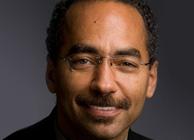Salih Booker is the Executive Director of The Centre on Housing Rights and Evictions. As the former Executive Director of Africa Action and Global Rights, he has extensive experience in the fields of human rights and African issues.
Salih Booker

Salih Booker is the Executive Director of The Centre on Housing Rights and Evictions. As the former Executive Director of Africa Action and Global Rights, he has extensive experience in the fields of human rights and African issues.
In 2006, as concern grows over the most pressing security threats, from HIV/AIDS and the bird flu to the ongoing genocide in Darfur, the U.S. will face increasing demands to adapt its Africa policy to address these contemporary challenges.
At the heart of the debate is the question of whether progressives believe that U.S. power can be used for good in Africa or elsewhere in cases of mass killings and other crimes against humanity?
Discussing U.S. policy in Africa
In 2003 U.S. policy toward Africa will be driven almost exclusively by geopolitical considerations related to Washington’s war plans against Iraq, and by its geostrategic interests in African oil.
Intended to stave off the embarrassment of coming empty-handed to a summit trumpeted as focusing on Africa, the White House initiative is in fact a cynical move to derail more effective action against AIDS.
By almost any measure, the war on AIDS is more important than the war on terrorism. Yet Washingtons fixation with the latterstill loosely definedcampaign threatens to crowd out attention to Africas priorities.
The U.S. will not escape the consequences of racism and colonialism no matter what course the government chooses.
Will Africa be âoff the agendaâ of a Bush administration?
A Bush presidency portends a return to the blatantly anti-African policies of the Reagan-Bush years, characterized by a general disregard for black people and a perception of Africa as a social welfare case.